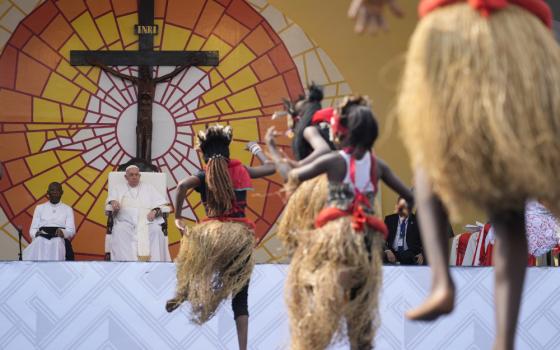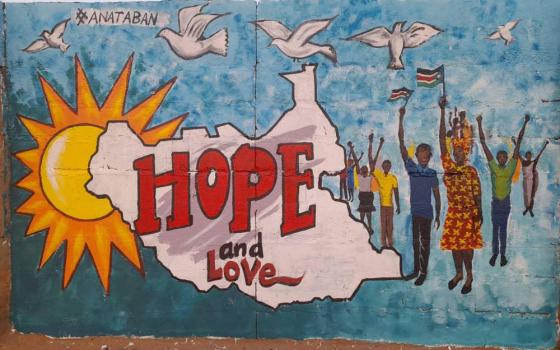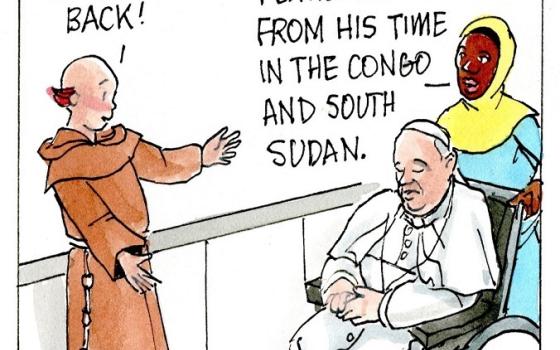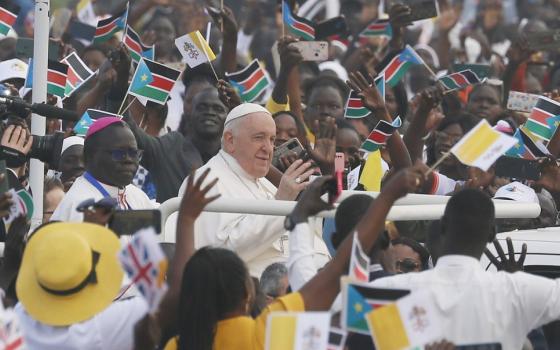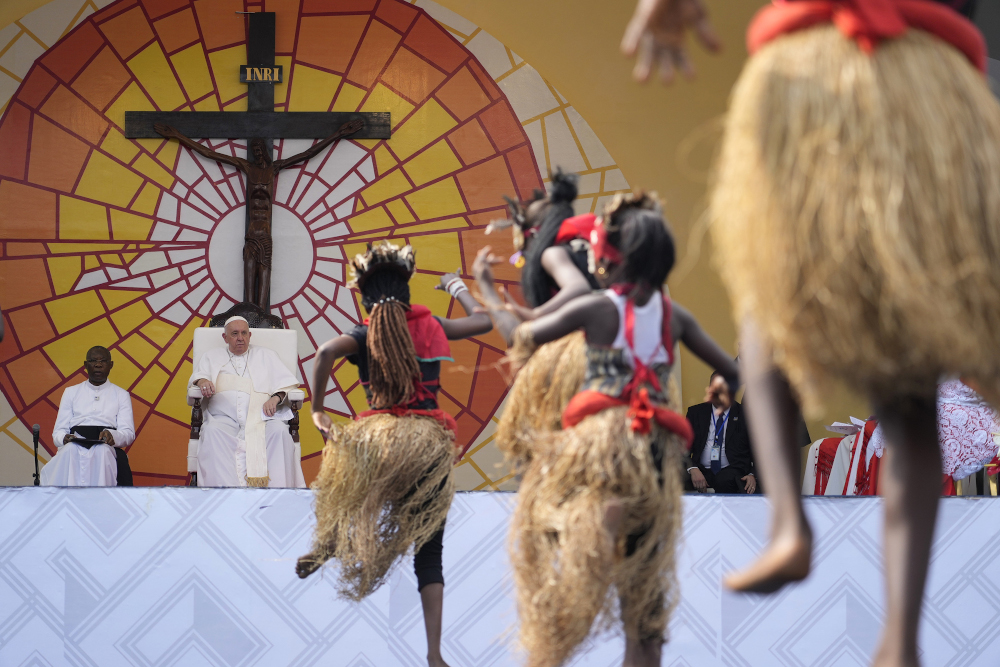
Pope Francis, second from left, watches traditional dancers perform at the Martyrs' Stadium in Kinshasa, Democratic Republic of the Congo Feb. 2. (AP/Gregorio Borgia)
A senior fellow from the Council on Foreign Relations has attacked Pope Francis for being "simplistic, condescending, and ahistorical" in his diagnosis of the causes of African underdevelopment during his recent trip to the Democratic Republic of the Congo.
The condemnation came in a Feb. 6 blog post by Ebenezer Obadare, the Douglas Dillon Senior Fellow for Africa Studies at the Council. He is also a senior fellow at the New York University School of Professional Studies Center for Global Affairs, as well as a fellow at the University of South Africa's Institute of Theology.
The author was set off by the pope's Jan. 31 address to Congolese politicians and other dignitaries gathered at the presidential palace in Kinshasa, the country's capital, where the pope condemned economic colonialism that is enslaving the Congo and the rest of Africa.
To those whose "poison of greed has smeared its diamonds with blood," the pope said, "hands off the Democratic Republic of the Congo! Hands off Africa! Stop choking Africa: It is not a mine to be stripped or a terrain to be plundered."
While briefly acknowledging that "the pope is not wrong about the colonial impact in the Congo," Obadare trashes Francis' "paternal peroration" for being "simplistic, condescending, and ahistorical."
Advertisement
Obadare opines that the pope's audience, the political class, "must have found his blithe exculpation of their complicity in the protracted underdevelopment of their country especially gratifying." The pope's approach amounts "to giving a moral pass to African leaders who have nary a conception of public good."
"Its insistence that Africans remain helpless captives to that history — basically a reduction of Africans to the status of permanent children — unwittingly plays to some of the worst racist tropes regarding African capacity."
Ouch.
"The allegations made in this blog are not new," says Anthony Annett, author of Cathonomics: How Catholic Tradition Can Create a More Just Economy and formerly of the International Monetary Fund. "They follow in a tradition of neoliberal economists like Peter Bauer, who blamed developing countries for their own plight and promoted such policies as absolute property rights and free markets. Pope Francis understands very well that those kinds of policies do not work."
"Africa today is stuck in a poverty trap," continues Annett. "To escape poverty, it needs to invest in health care, education and infrastructure. Since it lacks the resources to do this on its own, it needs help from richer countries. This is a special obligation of former colonial powers, who exploited colonies as a source of raw materials and refused to educate their people."
As an African, Obadare has every right to hold African leaders accountable for their failings. But, sadly, he appears to have relied on news reports, aimed at Western audiences, rather than the actual text of the pope's speech. These stories correctly focused on what readers in the developed world should know about what the pope said. But the pope said a lot more.
In his speech, Francis addressed Congolese leaders about "the future that is in your hands (italics in text) and for which you deserve to devote all your gifts of intelligence, wisdom and industry." He begs the leaders, "may every Congolese feel called to do his or her part! May violence and hatred no longer find room in the heart or on the lips of anyone, since these are inhuman and unchristian sentiments that arrest development and bring us back to a gloomy past."
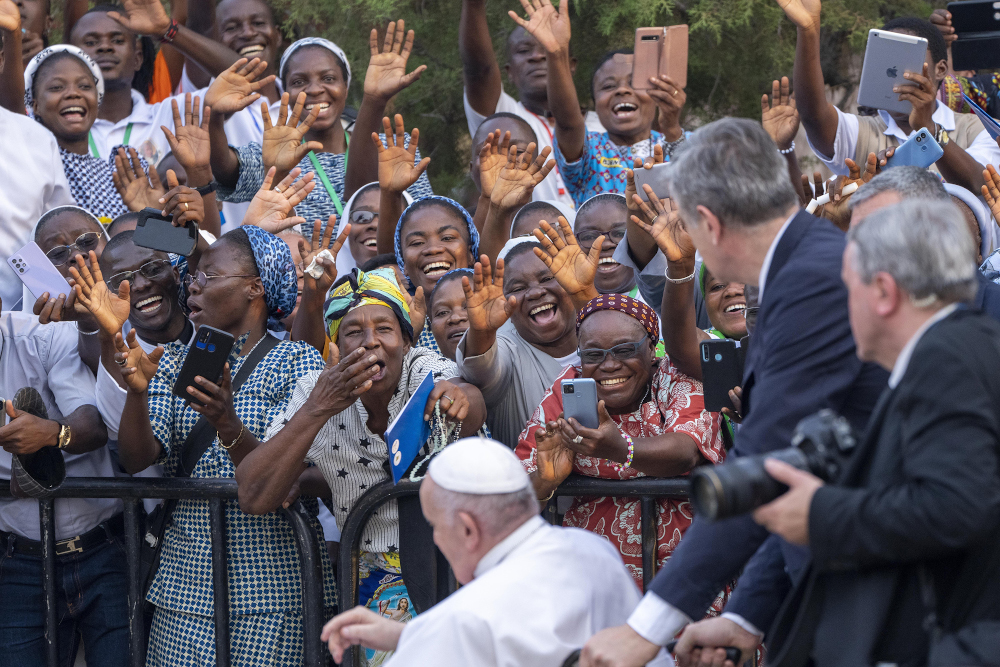
Pope Francis greets worshippers at Notre Dame du Congo Cathedral in Kinshasa, Congo, Feb. 2. (AP/Jerome Delay)
The pope also took on injustice and corruption directly: "What dims the light of goodness in a society is often the darkness of injustice and corruption." No one should be bought "by those who would foment violence in the country" or "exploit it in order to make shameful business deals."
To the political leaders, he pointedly quoted St. Augustine, who said that if there is no respect for justice, the state is a great confederacy of thieves.
"God is always on the side of those who hunger and thirst for justice," he said. "One must never tire of promoting law and equity everywhere, combating impunity and the manipulation of laws and information."
The pope also called for transparency in government and fair elections. "Power is meaningful only if it becomes a form of service," he told Congolese leaders. "How important it is that civic responsibilities be carried out in this spirit, avoiding authoritarianism, the quest for quick profit and the greed that the apostle Paul defines as 'the root of all evils.'"
He then calls on them to end child labor, to do more for education and health care and to protect the environment.
This is giving the political leaders "a moral pass"?
Francis' approach, according to Obadare, is also "a gratuitous slap in the face of ordinary Africans and civil society activists who risk all on a daily basis in their heroic defiance of morally bankrupt leaders who have no hesitation in mobilizing violence against their own citizens."
Again, by apparently failing to read the actual text of the speech, he misses the pope's explicit shoutout for civil society activists who "have demonstrated the ability to stand up to injustice and social decay at the cost of great sacrifice, in order to defend human rights, the availability of a quality education and a more dignified life for everyone."
As Cardinal Michael Czerny, head of the Vatican's Dicastery for Promoting Integral Human Development, pointed out that the pontiff applauded the courage of some Congolese and other African leaders and non-Africans who have promoted Congo's long-term development, while criticizing those who have exploited the country for their gain.
"His remarks reflect major themes of his teaching throughout his first 10 years as pope," said Czerny, "his consistent call for conversion of economic systems to prioritize the authentic common good rather than private gain for a few, and his absolute rejection of the 'throwaway' attitude towards any human beings."
"God is always on the side of those who hunger and thirst for justice. One must never tire of promoting law and equity everywhere, combating impunity and the manipulation of laws and information."
— Pope Francis
I could go on to cite what the pope said in his other speeches in the Congo, but I will limit myself to his Feb. 2 address to young people.
Here, as Obadare could have read in The New York Times, "Pope Francis put down his prepared remarks and instructed the stadium packed with young Catholics in Congo to make clear their opposition to the corruption that had hobbled their country with a single, rousing voice. 'All together,' Francis said. 'No to corruption.' The tens of thousands of faithful obliged in a roaring chant as the Pope's hands lifted off his knees."
Another reporter noted that the young people turned to face where the politicians were sitting as they chanted, "No to corruption."
Obadare is correct that Africa must take responsibility for its own future, but we in the developed world are also responsible if we buy natural resources that are stolen from Eastern Congo.
"There is no doubt that instability in Congo is the product of both internal and external factors," wrote Elizabeth Schmidt, professor emeritus of history at Loyola University Maryland and the author of six books about Africa. "Long-standing political, economic, and social inequalities; the legacies of colonial and Cold War practices; and the determination of political and economic elites to protect their power and wealth have led to numerous domestic conflicts that foreign interests have exploited."
Buying and selling involves at least two parties, as do bribes. Western governments must stop those who buy and give bribes; Africa must stop those who sell and take bribes.
Francis gave a comprehensive message that deserved better than the cheap shots fired off by Obadare in his blog. He came encouraging peace and reconciliation. The pontiff challenged the nation and offered hope, and "ordinary Africans" responded enthusiastically, with over a million turning out for his Mass in Kinshasa. They understood what he was saying even if Obadare did not.





